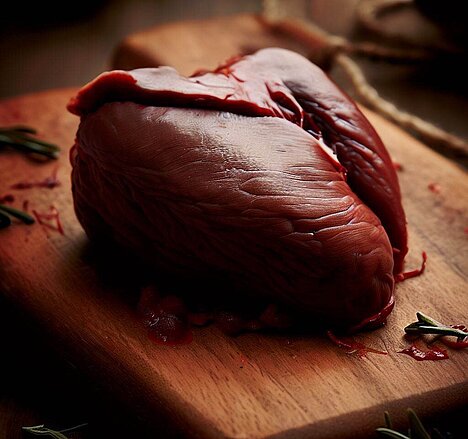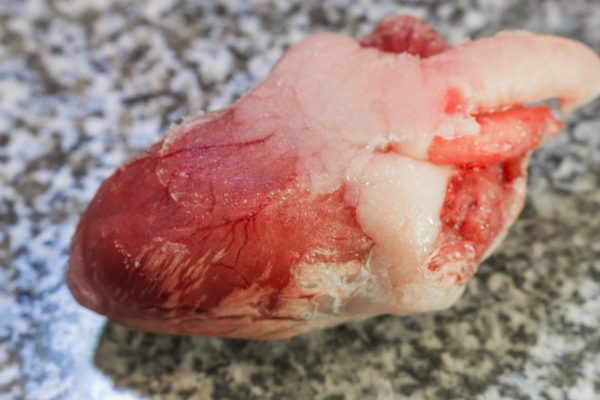Lamb hearts

What are lamb hearts?
Lamb hearts are the hearts of young sheep, usually slaughtered when they are less than a year old. They are a muscle organ and consist mainly of muscle meat. Lamb hearts have a firm consistency and a mild flavor. They are relatively small and weigh around 100 to 150 grams per piece.
How are lamb hearts processed?
Lamb hearts are usually sold fresh or frozen. You can order them in specialist shops, at the weekly market or online. Make sure that the lamb hearts are of good quality and come from species-appropriate husbandry. You should wash the lamb hearts thoroughly before feeding them and remove any fat or connective tissue residue. You can feed the lamb hearts to your dog whole or cut into pieces.
What are the benefits of lamb hearts for dogs?
Lamb hearts have several benefits for your dog's health and well-being. Here are some of them:
- Lamb hearts are a high-quality source of protein , which is important for muscle building and recovery. They contain all the essential amino acids that your dog cannot produce himself.
- Lamb hearts are rich in iron, which is responsible for the formation of red blood cells and the transportation of oxygen in the blood. An iron deficiency can lead to anemia, which manifests itself as tiredness, weakness and paleness.
- Lamb hearts are a good source of zinc , which is important for the functioning of the immune system, skin and wound healing. A zinc deficiency can lead to hair loss, skin problems and infections.
- Lamb hearts contain a lot of vitamin B12 , which is important for the formation of nerve cells, DNA synthesis and energy metabolism. A vitamin B12 deficiency can lead to neurological disorders, anemia and loss of appetite.
- Lamb hearts have a low fat content and a high water content, which makes them a low-calorie ingredient. This can help with your dog's weight control.
What are the disadvantages of lamb hearts for dogs?
Lamb hearts also have some disadvantages or risks that you should be aware of. Here are some of them:
- Lamb hearts can contain parasites or bacteria that can make your dog sick. Therefore, you should only buy lamb hearts from trustworthy sources and wash them well. You should also make sure that your dog is vaccinated and dewormed.
- Lamb hearts can cause allergies or intolerances if your dog is sensitive to lamb. This can manifest itself as itching, skin rashes, diarrhea or vomiting. If you notice such symptoms in your dog, you should consult a vet and stop feeding lamb hearts.
- Lamb hearts can increase your dog's uric acid levels if he eats too much of them. This can lead to gout or kidney stones, which can be very painful. You should therefore dose the amount of lamb hearts and not allow it to make up more than 10 percent of the daily food ration.
How do you feed your dog lamb hearts?
If you want to feed your dog lamb hearts, you should follow a few tips:
- Introduce lamb hearts slowly into your dog's diet to avoid potential digestive problems. Start with small amounts and gradually increase them.
- Mix lamb hearts with other ingredients such as vegetables or cereals to ensure a balanced diet. You can also add other offal such as liver or kidney to increase the nutritional diversity.
- Vary the types of meat you feed your dog to create variety and reduce the risk of allergies or intolerances. For example, you can use beef, chicken, horse or game meat.
- Consider your dog's individual needs in terms of age, size, activity and health status. Adjust the amount and frequency of feeding lamb hearts accordingly.
Lamb hearts are a nutritious ingredient for dogs that can have many health benefits. They are rich in protein, iron, zinc and vitamin B12 and have a low fat content. However, you should also be aware of some disadvantages or risks, such as parasite infestation, allergies or an increase in uric acid. You should therefore check the quality of the lamb hearts, wash them well and measure them out. You should also mix and vary them with other ingredients.
If you want to feed your dog lamb hearts, you should follow these tips:
- Introduce lamb hearts slowly
- Mix them with other ingredients
- Vary the types of meat
If you notice any signs of hypersensitivity or poisoning in your dog, you should see your vet immediately. We are not a substitute for a vet, but we try to be as accurate as possible. Every dog reacts differently and we recommend you get a second opinion or consult your vet if in doubt.
Stay healthy and take good care of your four-legged friend!😊
Similar to Lamb hearts
Goose hearts are, as the name suggests, the hearts of geese. They belong to the so-called offal or offal by-products that are produced during the processing of poultry. Goose hearts are rich in...
Poultry hearts are the heart muscles of chickens, turkeys or other poultry. They belong to the so-called offal or by-products, which are often regarded as a waste product of the meat industry....
Calf hearts are the hearts of young cattle that are usually slaughtered between six and twelve months old. They belong to the so-called offal or by-products that are produced during meat processing....
Quail hearts, as the name suggests, come from quails, small wild or domestic birds that are bred for their meat and eggs. Like other organs, quail hearts are rich in nutrients. They provide a...



